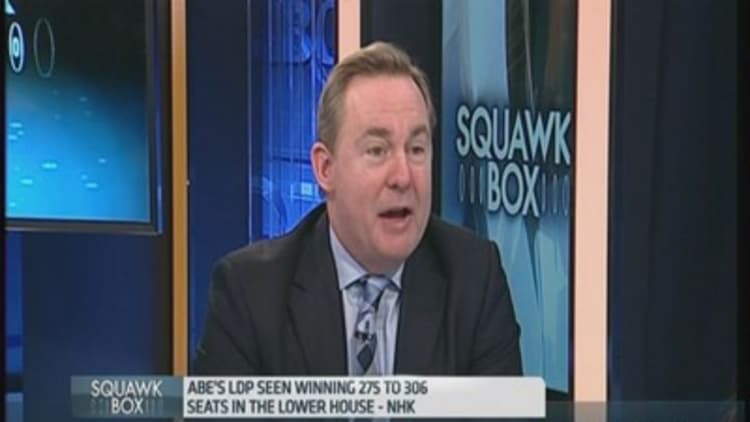After a ho-hum performance for most of 2014, analysts believe that Japan's Nikkei 225 will see better days in the year ahead.
"Japan has been an 'ok' investment based on local currency, [but] 2015 will be better, especially after the recent elections," Peter Boardman, managing director at Tradewinds, told CNBC. Shinzo Abe's ruling Liberal Democratic Party-led (LDP) coalition won snap elections by a landslide on December 14, maintaining a 'supermajority' in the lower house.
The Nikkei has risen 5.4 percent year to date, which pales in comparison to its 57 percent surge in 2013. The bulk of the gains came after the Bank of Japan shocked markets in late October by increasing its already massive asset-buying program; the market gained 15 percent since then as the yen tumbled 10 percent against the .
Read MoreJapan 4Q manufacturing sentiment worsens: Tankan
The central bank's move came as the economy tipped into a technical recession, putting Prime Minister Shinzo Abe's growth-revival plan, dubbed Abenomics, into question.
However, the Nikkei has seen steep falls since December 9 as a collapse in oil prices wreaks havoc on global markets. On Wednesday, it traded at 16,819.73, down 1,000 points over the course of seven sessions, before rebounding 2.3 percent on Thursday.
Policy, yen to drive market
Pro-growth policy activism and a weak yen will lead the market higher in the near term, analysts say. Throw in the mix a 10 trillion yen tax break, thanks to lower energy prices, and Japanese equities are set for a leg up in 2015, noted Tradewinds' Boardman.
"Deflation is over in Japan. If the yen stays low, foreign companies may return to take advantage of lower production costs. Together with government efforts' to lower taxes and stimulate the economy, 2015 makes for a pretty good year," he added. Boardman favors large exporters like Toyota Motor and casualty firms like Mitsui Sumimoto.
Read MoreJapan firmspromise Abe 'utmost efforts' to lift wages
Nomura expects the Nikkei to hit the 18,000-20,000 range, while the Topix will rise to 1,575 by end-2015. Market-positive factors include increased purchases of Japanese shares by the government's public pension fund and stronger-than-expected corporate earnings as a result of cheaper oil, weaker domestic currency and improving corporate governance.
"At the corporate level, companies are showing a clear pattern of improving profitability against the anaemic macroeconomic backdrop, as they pay more attention to controlling costs while reaping the benefits of a weaker yen," analysts wrote in a report.
An upward trend in real wages resulting from Abe's decision to postpone a second tax hike to 10 percent, initially scheduled for October 2015, also augurs well for consumer spending, which makes up 60 percent of Japan's gross domestic product, and in turn the stock market, Nomura added.

Not sold on Abenomics
To be sure, not all market watchers are bullish on the world's third-largest economy.
Benjamin Pedley, head of Investment Strategy, Asia at HSBC Private Bank, is less optimistic that "Abenomics" will resuscitate Japan's long-moribund economy.
"Even after an election win, the fact remains that the government needs to walk a tight rope between trying to be fiscally responsible and bringing the budget to a better position. It will be a tough road ahead," he told CNBC.
Read MoreAbe win does littleto spur Japan's economy
With the market already pricing in further weakness in the domestic currency, the benchmark Nikkei index is unlikely to see much upside in 2015, HSBC's Pedley added.
According to Nomura, other risks include a correction on Wall Street or a slower U.S. economic recovery.

